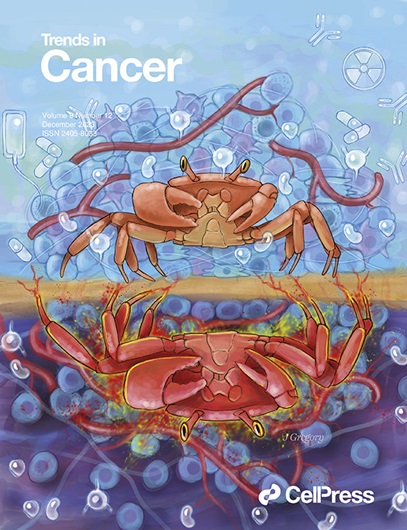smarca4突变型肺癌中SMARCA2降解的分子见解。
IF 17.5
1区 医学
Q1 ONCOLOGY
引用次数: 0
摘要
开关/蔗糖不可发酵(SWI/SNF)相关BAF染色质重塑复合体亚基atp酶2 (SMARCA2)降解的分子机制仍然是未知的。最近,Kotagiri等人发现,SMARCA2降解诱导smarca4突变肺癌细胞中的增强子重编程,使关键细胞周期基因的增强子无法进入并抑制其表达。此外,作者发现转录增强相关结构域(TEAD)抑制剂与SMARCA2降解物协同作用,抑制smarca4突变肺癌的生长。本文章由计算机程序翻译,如有差异,请以英文原文为准。
Molecular insights into SMARCA2 degradation in SMARCA4-mutant lung cancers.
The molecular mechanisms of switch/sucrose nonfermentable (SWI/SNF)-related BAF chromatin remodeling complex subunit ATPase 2 (SMARCA2) degradation remain elusive. Recently, Kotagiri et al. revealed that SMARCA2 degradation induces enhancer reprogramming in SMARCA4-mutant lung cancer cells, rendering enhancers of key cell-cycle genes inaccessible and suppressing their expression. In addition, the authors identified that transcriptional enhanced associate domain (TEAD) inhibitors synergize with SMARCA2 degraders in inhibiting SMARCA4-mutant lung cancer growth.
求助全文
通过发布文献求助,成功后即可免费获取论文全文。
去求助
来源期刊

Trends in cancer
Medicine-Oncology
CiteScore
28.50
自引率
0.50%
发文量
138
期刊介绍:
Trends in Cancer, a part of the Trends review journals, delivers concise and engaging expert commentary on key research topics and cutting-edge advances in cancer discovery and medicine.
Trends in Cancer serves as a unique platform for multidisciplinary information, fostering discussion and education for scientists, clinicians, policy makers, and patients & advocates.Covering various aspects, it presents opportunities, challenges, and impacts of basic, translational, and clinical findings, industry R&D, technology, innovation, ethics, and cancer policy and funding in an authoritative yet reader-friendly format.
 求助内容:
求助内容: 应助结果提醒方式:
应助结果提醒方式:


